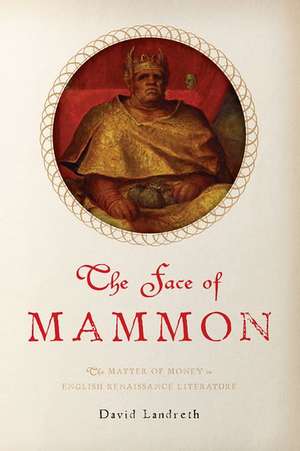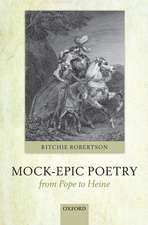The Face of Mammon: The Matter of Money in English Renaissance Literature
Autor David Landrethen Limba Engleză Paperback – 25 mai 2017
| Toate formatele și edițiile | Preț | Express |
|---|---|---|
| Paperback (1) | 217.20 lei 31-37 zile | |
| Oxford University Press – 25 mai 2017 | 217.20 lei 31-37 zile | |
| Hardback (1) | 421.59 lei 31-37 zile | |
| Oxford University Press – 31 mai 2012 | 421.59 lei 31-37 zile |
Preț: 217.20 lei
Preț vechi: 263.52 lei
-18% Nou
Puncte Express: 326
Preț estimativ în valută:
41.56€ • 43.50$ • 34.59£
41.56€ • 43.50$ • 34.59£
Carte tipărită la comandă
Livrare economică 19-25 martie
Preluare comenzi: 021 569.72.76
Specificații
ISBN-13: 9780190628222
ISBN-10: 0190628227
Pagini: 362
Ilustrații: 8 halftones
Dimensiuni: 231 x 150 x 23 mm
Greutate: 0.48 kg
Editura: Oxford University Press
Colecția OUP USA
Locul publicării:New York, United States
ISBN-10: 0190628227
Pagini: 362
Ilustrații: 8 halftones
Dimensiuni: 231 x 150 x 23 mm
Greutate: 0.48 kg
Editura: Oxford University Press
Colecția OUP USA
Locul publicării:New York, United States
Recenzii
The Face of Mammon is a refreshing addition to the steadily growing body of scholarship on money in the literature of the early modern period.... Landreth's richly evocative book is at its best when he discusses the ethical, religious, and political implications of the materiality of actual coins and the images stamped on them, a subject to which he returns throughout the book.
[A] striking, consistently intelligent study...The critic writes sharply and wittily throughout.... [T]his is a book that Elizabethanists in general, and Shakespeareans in particular, will not want to miss. Highly recommended.
I don't know what to admire more: David Landreth's nuanced account of price inflation in the sixteenth century, his detailed descriptions of the debasement and clipping of coinage, his philosophical grasp of the ontology of the money form, or his striking and original readings of early modern authors. This is an indispensable contribution to our understanding of economy and literature.
If, as the saying goes, 'money talks,' its most loquacious avatar is the Mammon of early modern writing. And Mammon's most astute listener is David Landreth, who hears in the prosopopeia that lends voice to early modern money the prehistory of capitalist conceptions of matter, value and social relations.
Landreth offers a fascinating account of the ways in which the matter of money mattered in Tudor England by revealing the many faces Mammon assumed in a wide array of literary and cultural texts. We have always known that money talks; Landreth teaches us how to listen.
[A] splendid book.
[A] striking, consistently intelligent study...The critic writes sharply and wittily throughout.... [T]his is a book that Elizabethanists in general, and Shakespeareans in particular, will not want to miss. Highly recommended.
I don't know what to admire more: David Landreth's nuanced account of price inflation in the sixteenth century, his detailed descriptions of the debasement and clipping of coinage, his philosophical grasp of the ontology of the money form, or his striking and original readings of early modern authors. This is an indispensable contribution to our understanding of economy and literature.
If, as the saying goes, 'money talks,' its most loquacious avatar is the Mammon of early modern writing. And Mammon's most astute listener is David Landreth, who hears in the prosopopeia that lends voice to early modern money the prehistory of capitalist conceptions of matter, value and social relations.
Landreth offers a fascinating account of the ways in which the matter of money mattered in Tudor England by revealing the many faces Mammon assumed in a wide array of literary and cultural texts. We have always known that money talks; Landreth teaches us how to listen.
[A] splendid book.
Notă biografică
David Landreth is an Associate Professor of English at the University of Calfornia, Berkeley.














